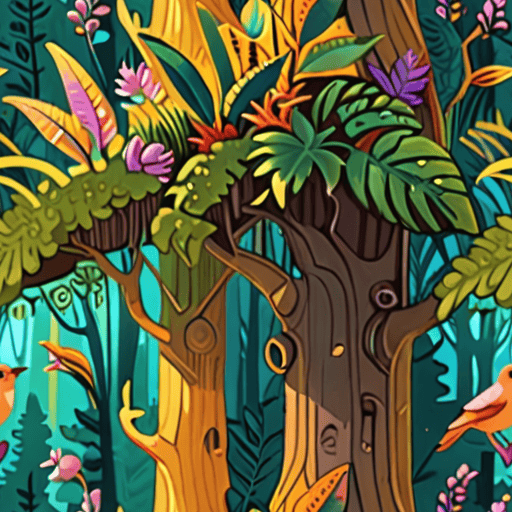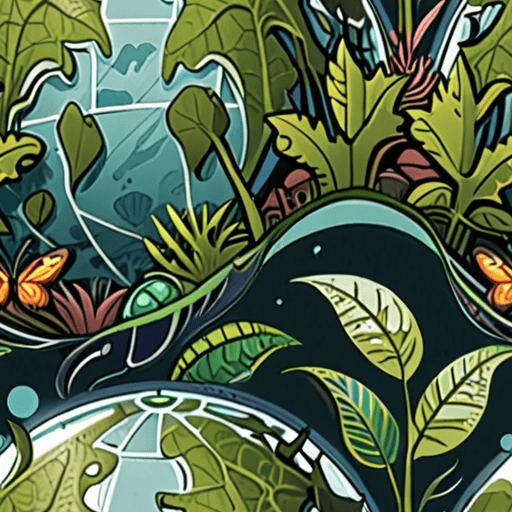In today’s world, where environmental concerns are increasingly prominent, preserving biodiversity has become a pressing issue that requires immediate attention. As we navigate the complexities of climate change, habitat destruction, and species extinction, it’s essential to understand the significance of preserving biodiversity and its impact on a thriving planet. By exploring effective strategies for preserving biodiversity, we can unlock the power of conservation and work towards creating a sustainable future for generations to come.

Preserving Biodiversity
We believe that preserving biodiversity is crucial for maintaining healthy ecosystems and supporting life on Earth.
- Sustainable Practices:
- Reduce waste and minimize harm to ecosystems by choosing eco-friendly products and reducing consumption.
- Support conservation efforts by donating to reputable organizations or volunteering your time.
- Spread awareness about the importance of biodiversity through education and community engagement.
Protecting Endangered Species
Endangered species play a vital role in maintaining ecosystem balance, and protecting them is essential for preserving biodiversity.
- Learn about the species most affected by human activities and support conservation efforts.
- Make informed choices when shopping for products, avoiding those that contribute to deforestation, pollution, or habitat destruction.
- Get involved in local initiatives that promote wildlife conservation and habitat restoration.
Nature-Based Solutions
Nature-based solutions offer a powerful approach to addressing environmental challenges and promoting biodiversity.
- Partner with communities to create protected areas and promote sustainable land-use practices.
- Invest in reforestation efforts and support sustainable agriculture practices.
- Promote eco-tourism and support local economies that benefit from conservation efforts.
Climate Change Mitigation
Climatet change poses a significant threat to biodiversity, making mitigation efforts crucial for preserving ecosystems.
- Support organizations working on nature-based solutions to mitigate climate change.
- Invest in renewable energy sources and reduce carbon emissions.
- Advocate for policies that prioritize environmental protection and conservation.
Working Together
Preserving biodiversity requires collective effort and cooperation among individuals, organizations, and governments.
We invite you to join us in our mission to protect the planet and its precious biodiversity.
Learn More About Our Climate Initiatives Get Involved in Conservation Efforts Support Our Work
Preserving Biodiversity
We believe that preserving biodiversity is crucial for maintaining healthy ecosystems and supporting life on Earth.
- Biodiversity refers to the variety of different species of plants, animals, and microorganisms that live in an ecosystem.
- When we preserve biodiversity, we are protecting the delicate balance of nature and ensuring that ecosystems can continue to function properly.
- This includes protecting habitats, conserving water sources, and promoting sustainable land-use practices.
The Importance of Preserving Biodiversity
There are many reasons why preserving biodiversity is essential:
- Supports Human Health: Many medicines and treatments are derived from plants and animals found in nature.
- Provides Ecosystem Services: Healthy ecosystems provide clean air and water, regulate the climate, and support agriculture.
- Boosts Economic Growth: Sustainable tourism and eco-friendly industries can create jobs and stimulate local economies.
- Helps Mitigate Climate Change: Preserving forests, wetlands, and other ecosystems helps to sequester carbon dioxide and reduce greenhouse gas emissions.
Our Approach to Preserving Biodiversity
We take a holistic approach to preserving biodiversity, working with local communities, governments, and other stakeholders to protect and restore ecosystems.
- Protected Areas: We work to establish and manage protected areas, such as national parks and wildlife reserves, to safeguard critical habitats and species.
- Sustainable Land-Use Practices: We promote sustainable agriculture, forestry, and urban planning practices to minimize harm to ecosystems and conserve natural resources.
- Community Engagement: We engage with local communities to raise awareness about the importance of biodiversity and involve them in conservation efforts.
Success Stories
We have made significant progress in preserving biodiversity through our conservation efforts:
- Protected 26 million acres of land, avoiding 3.9 billion tons of CO2 emissions.
- Supported the creation of 10 new protected areas, safeguarding critical habitats and species.
- Trained over 1,000 community members in sustainable land-use practices and biodiversity conservation.

Why Biodiversity Matters for a Thriving Planet
Biodiversity is crucial for sustaining life on Earth, including human existence.
- The diversity of species supports ecosystem services that benefit humanity, such as clean air and water, soil formation, and pollination.
- A wide range of plant and animal species helps regulate the climate, mitigate the effects of natural disasters, and maintain nutrient cycles.
- Biodiversity also provides opportunities for scientific discovery, economic benefits through sustainable resource management, and cultural enrichment through the preservation of traditional knowledge and practices.
Nature and Culture’s Efforts to Preserve Biodiversity
We work with local communities to establish protected areas, promote sustainable land-use practices, and conserve threatened and endangered species.
- Our conservation efforts have resulted in the protection of 26 million acres of land, which avoids approximately 3.9 billion tons of CO2 emissions.
- We collaborate with governments, NGOs, and local stakeholders to develop and implement effective conservation strategies.
- Our approach prioritizes community engagement, education, and capacity-building to ensure long-term success and sustainability.
The Importance of Preserving Biodiversity for Human Well-being
Biodiversity loss can have severe consequences for human health, food security, and economic stability.
- The decline of pollinators, such as bees and butterflies, threatens global food production and access to nutritious food.
- The loss of medicinal plants and animals can compromise the development of new medicines and treatments.
- Biodiversity loss can also exacerbate the impacts of climate change, leading to increased poverty, migration, and conflict.
Working Together to Protect Biodiversity
We recognize the critical role that individuals, organizations, and governments play in preserving biodiversity and promoting sustainable development.
By supporting conservation efforts, reducing our ecological footprint, and advocating for policy changes, we can collectively protect the natural world and ensure a thriving planet for future generations.

Why Preserve Biodiversity?
We believe that preserving biodiversity is crucial for maintaining healthy ecosystems, supporting human well-being, and addressing global challenges.
-
Reason 1: Climate Change Mitigation
Nature-based solutions can play a vital role in reducing greenhouse gas emissions and mitigating the effects of climate change. By protecting and restoring natural habitats, we can sequester carbon dioxide, support sustainable land-use practices, and promote ecosystem resilience.
At Nature and Culture International, we’ve protected 26 million acres of land that avoid 3.9 billion tons of CO2 emissions. Our work demonstrates the potential of nature-based solutions to combat climate change.
Learn more about our approach to climate change mitigation at our website .
-
Reason 2: Ecosystem Services and Human Well-being
Biodiverse ecosystems provide essential services that support human well-being, including clean air and water, food security, and mental health benefits. By preserving these ecosystems, we can ensure the long-term health and prosperity of local communities.
For example, forests provide habitat for countless plant and animal species, while also regulating the water cycle and supporting agriculture. Preserving these ecosystems is critical for maintaining ecosystem services and promoting human well-being.
-
Reason 3: Biodiversity Conservation and Research
Preserving biodiversity allows us to study and understand the complex relationships between species and their environments. This knowledge informs conservation efforts, supports scientific research, and helps us develop effective strategies for protecting threatened and endangered species.
By conserving biodiversity, we can gain valuable insights into the natural world and develop innovative solutions to pressing environmental challenges.
The Biggest Challenge in Preserving Biodiversity
We face numerous challenges in preserving biodiversity, but one of the most significant obstacles is the loss of habitat due to human activities.
- Deforestation, urbanization, and agriculture have led to the destruction and fragmentation of natural habitats, resulting in devastating impacts on many species.
- Climate change exacerbates these effects, altering ecosystems and disrupting delicate balances between species and their environments.
- Human population growth and consumption patterns further strain natural resources, driving habitat destruction and degradation.
At Nature and Culture International, we recognize the importance of addressing these challenges through sustainable land-use planning, conservation efforts, and community engagement.
- We work with local communities to establish protected areas, promoting coexistence with wildlife and preserving ecosystem services.
- Our nature-based solutions mitigate climate change by sequestering carbon, supporting biodiversity, and enhancing ecosystem resilience.
- We collaborate with governments, NGOs, and private sector partners to develop and implement effective conservation strategies.
By combining our expertise with community-led initiatives, we can effectively address the biggest challenge in preserving biodiversity – the loss of habitat – and create a more sustainable future for all.
In fact, our efforts have already made a significant impact, protecting 26 million acres of land that avoid 3.9 billion tons of CO2 emissions.
Other organizations, such as The Nature Conservancy ( https://www.nature.org/en ) and the World Wildlife Fund ( https://www.worldwildlife.org/ ), share our commitment to preserving biodiversity and addressing the root causes of habitat loss.
Together, we can create a world where humans and wildlife thrive together, and the natural beauty and diversity of our planet are preserved for generations to come.

Three Reasons for Maintaining Biodiversity
We believe that preserving biodiversity is crucial for a healthy planet, and here are three compelling reasons why.
-
Reason 1: Ecological Balance
Maintaining biodiversity ensures that ecosystems remain balanced and resilient to external pressures. A diverse array of plant and animal species helps to regulate the environment, prevent the spread of diseases, and support nutrient cycles.
For example, forests with high levels of biodiversity tend to be more resistant to pests and diseases, which can devastate crops and timber yields. By preserving these ecosystems, we can protect our food supplies and maintain the health of our forests.
Learn more about how we’re working to protect forests and promote sustainable land-use practices at our website .
-
Reason 2: Climate Regulation
Biodiverse ecosystems play a critical role in regulating the Earth’s climate. They absorb carbon dioxide, produce oxygen, and help to moderate weather patterns.
For instance, mangrove forests along coastlines can reduce the impact of storms and tsunamis by absorbing wave energy and protecting shorelines. By preserving these ecosystems, we can mitigate the effects of climate change and support coastal communities.
Discover more about our efforts to protect mangroves and promote climate resilience at this page .
-
Reason 3: Human Well-being
Maintaining biodiversity has numerous benefits for human well-being, from providing medicine and food to supporting recreation and tourism.
For example, many medicines are derived from plants and animals found in tropical rainforests. By preserving these ecosystems, we can ensure access to essential medicines and support the development of new treatments.
Explore our work on conservation and sustainable livelihoods at this section .
Conclusion
In conclusion, maintaining biodiversity is essential for a healthy planet and a prosperous future. By preserving ecological balance, regulating the climate, and supporting human well-being, we can ensure a bright future for generations to come.

0 Comments